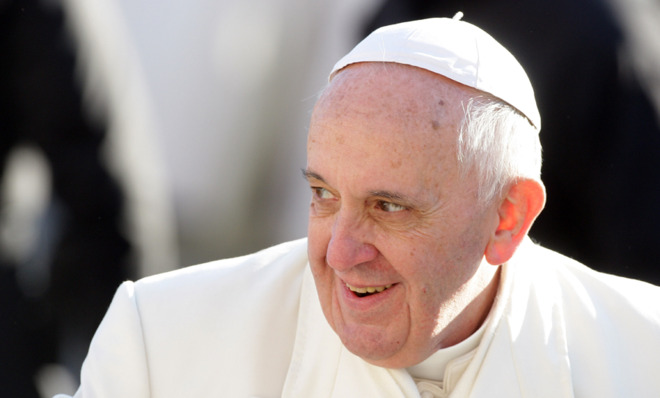Pope Francis just expertly trolled his critics
When faced with a McCarthy-esque smear campaign, best to pull a communist switcheroo

A free daily email with the biggest news stories of the day – and the best features from TheWeek.com
You are now subscribed
Your newsletter sign-up was successful
Since Pope Francis began speaking in public about the Christian view on economic matters, opponents have engaged in what often feels like a McCarthy-era smear campaign, accusing the Pope of things like Marxism, communism, and Leninism.
It was Rush Limbaugh on his radio show that first leveled charges of Marxism after the publication of Pope Francis' apostolic exhortation Evangelii Gaudium; he later doubled down on the accusations:
Pope Francis called today for governments to redistribute wealth to the poor in a new spirit of generosity to help curb the economy of exclusion that is taking hold today…That's Marxism, that's socialism. That's not charity.
Following suit, an Economist blogger diagnosed Pope Francis' recognition of a link between capitalism and violence as Leninism. "Francis may not be offering all the right answers," the piece opines, dripping with patronizing conceit, "or getting the diagnosis exactly right, but he is asking the right questions. Like a little boy who observes the emperor's nakedness."
The Week
Escape your echo chamber. Get the facts behind the news, plus analysis from multiple perspectives.

Sign up for The Week's Free Newsletters
From our morning news briefing to a weekly Good News Newsletter, get the best of The Week delivered directly to your inbox.
From our morning news briefing to a weekly Good News Newsletter, get the best of The Week delivered directly to your inbox.
The pattern is always the same: dismiss Pope Francis, with the greatest respect for his office or the most genteel admiration of his character, by labeling his ministry more political than theological. And the motives attributed to Pope Francis are never neutral; rather, they're mere metonymy, short for larger arguments.
Identifying Pope Francis' theological analyses with the boogeymen political ideologies of yesteryear denies, however implicitly, that what he is doing is strictly Christian. This is accomplished by conflating what is religious with what is secular, and in part through selecting ideologies that have been defamed in American culture for their anti-Christian tendencies.
It will likely never matter to these critics that Pope Francis himself has emphatically denied any association with Marxism or Marxist ideology. And so in a recent interview, he took another tack: Rather than making another attempt to roundly decry a set of ideologies no one seriously suspects him of adhering to, Pope Francis turned the criticisms around on the critics:
"I can only say that the communists have stolen our flag. The flag of the poor is Christian. Poverty is at the center of the Gospel," he said, citing Biblical passages about the need to help the poor, the sick and the needy. "Communists say that all this is communism. Sure, twenty centuries later. So when they speak, one can say to them: 'but then you are Christian'." [Pope Francis, via Reuters]
In other words, since his concern for the poor causes critics to accuse him of Marxism, Pope Francis reversed their accusations: rather than Christianity looking suspiciously communist over its concern for the poor, perhaps communism looks suspiciously Christian. After all, justice for the poor is hardly a communist invention; as Pope Francis points out, a focus on helping the poor was native to Christianity long before the 19th century.
A free daily email with the biggest news stories of the day – and the best features from TheWeek.com
But Pope Francis' reversal has another effect: namely, it calls into question why our political narratives immediately categorize any demand for justice for the poor as anti-Christian communism. In fact, it would seem rather impossible to practice any legitimate form of Christianity without seeking justice for the poor. If we immediately identify support for impoverished people as evidence of some anti-Christian impulse, then we've built up a political narrative that can't sustain the truth about Christianity.
For that reason, Pope Francis' refusal to capitulate to how political types would like to contain the radical power of Christianity is especially valuable, and especially irksome. For as long as he's unwilling to contain his Christianity to the realms it's politically welcome in — say, legislation related to sex and reproduction — it will be too vast and too revolutionary for his critics, who will fail to see it as Christian at all, and will continue bandying about accusations of communism, Marxism, and so forth.
But it's hard to imagine those kinds of attacks will ever do much to harm Pope Francis or his message, given that his refusal to pay heed to secular political categories offers a broader range of political thought than his critics' tribal views. Pope Francis puts Christian ethics first, rather than trying to see where Christian ethics will fit in a given political ideology. It's for this reason he can say that communism has stolen the flag of Christianity, and it's his fundamental grounding in faith that will ultimately make his message so powerful.